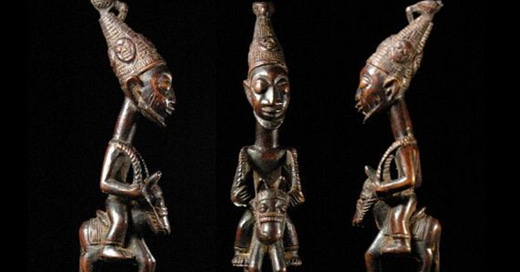This is post #3.
We acknowledge the Almighty ÒYO ÌWÀ (the Creator of Existence) and salute every man, woman and child. We salute the home-born and the stranger - Ìbà ọ!
A certain gentleman by the name Richard Francis Burton authored a deeply poignant book in 1865 titled “Wit and Wisdom from West Africa: Or, A Book of Proverbial Philosophy, Idioms, Enigmas, and Laconisms”.
In this book, Burton recorded an interesting dialogue between two European clergymen; one Bishop Lowth and another Bishop Jeff. This particular conversation which is captured in the introduction to the book spared no words to exalt the glorious status of the Yoruba.
We now take the liberty to quote from the book as follows;
“Were we to measure this people by the standard of their proverbial morality, we should come to the conclusion that they had attained no inconsiderable height in the development of social relations, having passed out of that savage barbarism, in which every individual lives for himself alone, into a higher state of being, in which the mutual dependence of one member on another is recognised, giving room for the exercise of social virtues as a sort of moral compact for the safeguard of society”.
One Mr. Vidal draws the following deductions: -
“Surely these are indications of no ordinary perception of moral truths, and sufficient to warrant the inference that in closeness of observation, in depth of thought, and in shrewd intelligence, the Yoruban is no ordinary man”.
The Yoruba people of the world are indubitably a distinct specie of people.
Being Yoruba ranks as one of the most exciting things in our own lives. It feels like we won ovarian lottery when we consider the blessedness of this race.
We are truly a dignified people.
We are the people who consider good character to be the ultimate attire. We place good character above material wealth. The Yoruba is not a push over.
Ours is a goodly heritage; a dynasty of dignified people; a paragon of excellence and a people who thrive in good chaacter.
We are ỌMỌLUWABI.
Yes, we are industrious, enterprising and so much more but we are above all things, the children of the Almighty. Ikira (salutation) to the beautiful ones.
May it be well with us, today and next - Àṣẹ wàá!
Ire o!
BIBLIOGRAPHY
Richard, F. Burton, Wit and Wisdom from West Africa; A book of proverbial philosophy, idioms, enigmas and laconisms, Bible and Tannen, 1969 (originally published in 1865)






